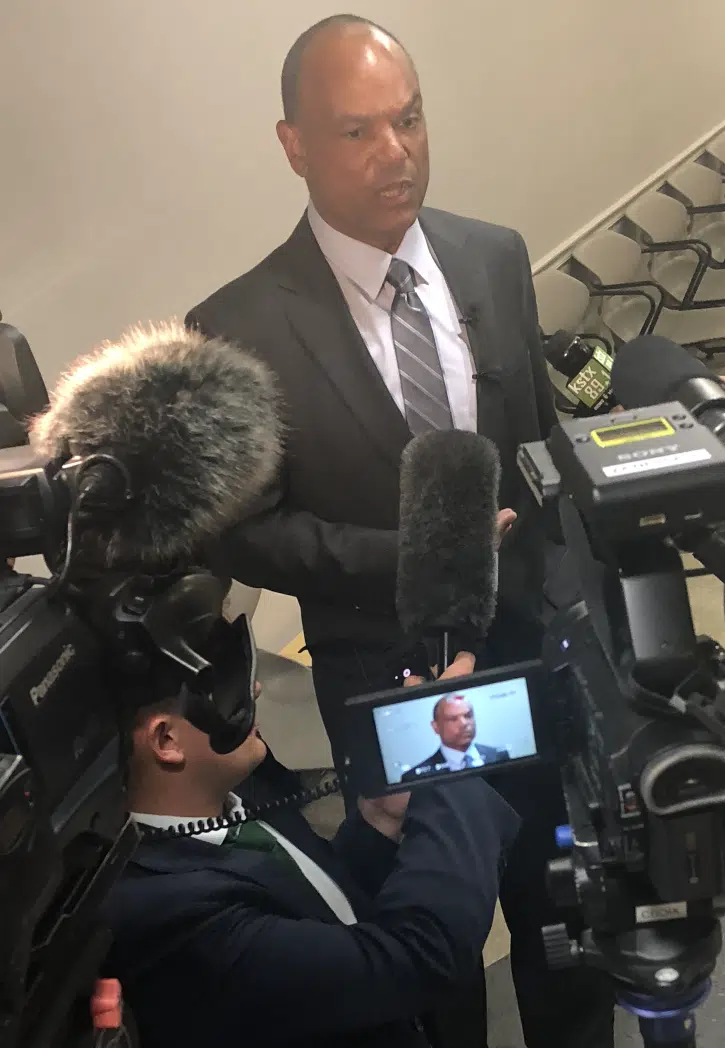
(Seguin) — The attorney for the Guadalupe-Blanco River Authority is describing Monday’s temporary settlement agreement to not dewater area lakes as a “good faith agreement” entered into by both parties.
GBRA Attorney Lamont Jefferson says it’s not only a good first step to finding a solution but it also initiates action to keep people safe.
“I think it recognizes and does a good job of balancing the interests of all parties — the property owners and the interest of GBRA in protecting the public from what it perceives as a real hazard,” said Jefferson.
Jefferson says the GBRA is ready to enlist in the action items agreed to with the plaintiffs in this temporary injunction case. He says the river authority sees this as a “reasonable solution.”
“I think about the sequence of things, the second dam failed in May of this year, a very dramatic failure. We all saw it in court. Something needed to be done. After that was done, immediately homeowners were engaged and GBRA discussed different options. In July, they retained Black & Veatch to offer engineering reports. In August, Black & Veatch made the recommendations and their recommendations from GBRA’s assessment was that there was a very serious threat to life and property on these lakes and so, GBRA made the decision to dewater the lakes and at that point, there was no cooperation by anybody. It was a decision that GBRA made. So things have moved pretty quickly since then and now all of the property owners are agreeable apparently to at least the ones that are plaintiffs in this case to closing the lakes so that there is no activity, we get a third party expert to opine on if there are unsafe or safe zones around the lakes and we go from there. It’s a very reasonable solution in my mind,” said Jefferson.
Although it has agreed to hold off on the dewatering, Jefferson says their claims remain unchanged and defends GBRA’s maintenance of the properties over the years.
“I’ll tell you what, it seems obvious to me that these spillgates can not and will not last so leaving the gates where they are indefinitely is not going to work. They will fail eventually just as we have seen two of them fail,” said Jefferson. “I think if you look at the history and the records, yes, these dams were very well maintained. That’s why they are still standing after 90 years. There are components to the dams that you cant’ get to. They cant’ be maintained. All they do is age. You can’t make them stronger. You can’t make them last longer so at some point, they run out of life and when that happens, they fail and we’ve seen that happen twice in connection with this system. Other than that, the dams operate. They do the job that they are designed to do and that doesn’t happen by accident. It happens because there has been constant maintenance on these dams.”
Regarding statute, Jefferson says he defends GBRA’s position, and says the law is clear.
“If you look at the statute, it’s an enabling statute. It says what it says and it does not say that GBRA is required to maintain dams or operate dams or even have hydro electricity. The statute grants the GBRA a very broad authority to do a number of things or not to do a number of things. It has to manage the waters of the state responsibly within its district and it has done that and that’s about the only obligation that it has. There is no statutory obligation or any other lawful obligation requiring the GBRA to keep these hundred old spillgates in operation,” said Jefferson.
Attorneys for the plaintiffs Ricardo Cedillo and Douglas Sutter also felt that it was unfortunate that all good faith efforts to reach a settlement prior to last week were not seriously considered by GBRA. Cedillo stated his clients would rather have spent their money on finding a solution than on the cost of lawyers.
Jefferson disagrees and says reaching a settlement until court is not unusual.
“I’m not really privy to all of the reasons of (why) things went the way they did. I mean often times, it takes getting to court for both sides to become reasonable and to focus the mind. It’s not unusual at all for cases to settle after trial start and after kind of the reality of court. There are no guarantees in litigation so if you can reach a result through an agreement that the parties can live with. That’s almost always the best route to go,” said Jefferson.
Upon reconvening Monday, both sides announced to Visiting Judge Stephen Ables that GBRA had initiated a settlement discussion for the pair of plaintiffs who were opposed to the draining of the area hydro electric lakes.
Jefferson at that time, stated that GBRA would agreed to the temporary injunction as so long folks would be kept off the lakes until the safety experts could provide more.
Jefferson had also stated that while he felt that the plaintiffs seemed receptive in ordering the temporary injunction, he didn’t think they were in agreement with each other on some of the bullet items listed on that plan.
Cedillo responded by saying that he wanted to make clear that he and Sutter were 95 percent in total agreement, and not so separate as Jefferson had alluded to during the proceeding.
He went on to state that “the devil is in the details” and felt that they could bridge that five percentage point gap when they returned back to the courtroom. All parties then left to further discuss the settlement coming back with the compromise after almost four hours in negotiations.




